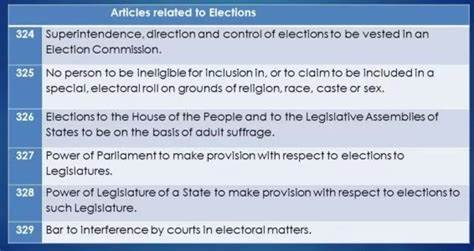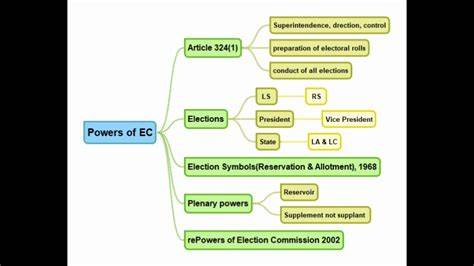India is paving the way for truly accessible elections
GS Paper – 2, Constitutional Bodies, Transparency & Accountability
The founders of the Indian Constitution saw representative parliamentary democracy as the form of government best suited to the needs, character, and history of India.
They envisioned equitable and inclusive participation of all adult people in the democratic process. The Indian republic appeared to function best with legislators chosen through universal adult suffrage and free and fair elections.
The Lok Sabha, Rajya Sabha, State Assemblies, Legislative Council, President, Vice-President, Local Bodies, Municipal Corporation, Gram Panchayat, Zila Panchayat, and Block Panchayat are all elected in India.
However, a number of issues with the current electoral system cast doubt on its “free and fair” status. Therefore, it is essential that these problems be carefully considered and handled comprehensively.
What are the Constitutional Provisions Related to Elections in India?
- Article 326: According to the Constitution, adult suffrage shall be used in all elections for the House of the People and the Legislative Assembly of each State.
- An independent Election Commission is given supervision, direction, and control over the creation of electoral rolls and the conduct of elections under Article 324.
- Elections to local bodies, such as Panchayats and Municipalities, are the duty of State Election Commissions under Articles 243K and 243ZA.
- The Legislature of a State has the authority to establish rules governing elections to that Legislature under Article 328.
What are the Powers and Responsibilities of the Election Commission?
- Determining the Electoral Constituencies’ territorial areas throughout the country.
- Preparing and periodically revising electoral rolls and registering all eligible voters.
- Notifying the schedules and dates of elections and scrutinising nomination papers.
- Granting recognition to the various political parties and allocating them election symbols.
- The Commission also has advisory jurisdiction in the matter of post-election disqualification of sitting members of Parliament and State Legislatures.
- It is also responsible for conducting bye-elections in any constituency whenever the need arises.
What are the Challenges Associated with Free and Fair Elections in India?
- Distorting Informed Decision Making of Voters: Unchecked populism that gives “irrational freebies” during election campaigns biases voters, especially the underprivileged, as freebies can influence their choice of representatives and influence their ability to make an informed decision.
- Lack of Independent Staff: Since ECI does not have its own staff, it relies on those of the Central and State Governments whenever elections are held.
- Because of this, the administrative staff is also in charge of regular administration in addition to electoral administration, which reduces the impartiality and effectiveness of the election process.
- No Statutory Backing for Enforcing Model Code of Conduct (MCC): There is uncertainty surrounding the Election Commission of India’s (ECI) ability to enforce the Model Code of Conduct (MCC) and other election-related rulings on the ground.
- Booth Capturing: A polling booth, which is the designated location where voters exercise their right to vote, is the most important part of the election process.
- Due to the decline in political morals, there are many cases of “booth capturing,” in which supporters of one party or hired criminals “take” a polling location and cast votes for a specific candidate in lieu of registered voters.
- Politicisation of Social Media: Public opinion is reflected in social media and is used as a measure of democracy. However, one of the most frequent complaints about social media is that it breeds echo chambers where users are only exposed to opinions they share.
- The political campaigns on social media sometimes spark religious and social tensions in different parts of the country that affect the impartial electoral process.
- Inaccessibility of Booth for PwD: A large number of persons with disability (PwD) faced immense problems in casting their vote due to lack of supporting infrastructure at polling booths.
What are the Recent Initiatives by Election Commission of India?
- Systematic Voters’ Education and Electoral Participation (SVEEP)
- Model Polling Station
- Committe for Accessible Elections at National and State Level
- Electors Verification Programme.
- Cvigil App – to report the violations of Model Code of Conduct (MCC)
- Voter Helpline App- to ease the registration process
- Divyang Sarathi and Divyang Doli
What Should be the Way Forward?
- Democratizing Elections: Egality for all parties is demanded in a democracy, and free and fair elections guarantee such chances.
- Strict guidelines must be set for the use of social media for political objectives in order to guarantee that minorities’ political campaigns receive equal attention.
- The Indian Election Commission can take extreme measures to prevent one party from unfairly benefiting over another simply because it is in power.
- Regulations must be upheld to guarantee that checks on the use of personal data in connection with electoral campaigns abides by national laws.
- No Voter to be Left Behind: The Election Commission shall provide “participative, accessible, inclusive” elections in addition to holding free and fair elections by putting in place the appropriate facilities and infrastructure, especially for those with disabilities.
- Voter Awareness: Electors have the authority to stop or allow the march of giveaways. Regulation of irrational freebies and safeguarding against voters being persuaded by irrational promises must be agreed upon.
- All of this requires eternal vigilance on the part of the voting class.
- Enforcing Model Code of Conduct: The Model Code of Conduct For Guidance of Political Parties and Candidates needs to be put into practise by giving it statutory support in order to properly control election manifestos and stop the manipulation of informed voter behaviour.
- Law Commission 255th Report on Electoral Reforms: This paper suggests that the Electoral Commission of India (ECI) establish a permanent and autonomous Secretariat similar to the Lok and Rajya Sabha Secretariats.
- Furthermore, State Election Commissions can also be provided with similar provisions to guarantee their autonomy and fairness.UPSC Civil Services Examination,
- Strict guidelines must be set for the use of social media for political objectives in order to guarantee that minorities’ political campaigns receive equal attention.
Previous Year Questions (PYQs) Prelims
- Consider the following statements: (2017)
- The Election Commission of India is a five-member body.
- The Union Ministry of Home Affairs decides the election schedule for the conduct of both general elections and bye-elections.
- Election Commission resolves the disputes relating to splits/mergers of recognized political parties.
Which of the statements given above is/are correct?
(a) 1 and 2 only
(b) 2 only
(c) 2 and 3 only
(d) 3 only
Ans: (d)
Mains
Q. Discuss the role of the Election Commission of India in the light of the evolution of the Model Code of Conduct. (2022)





